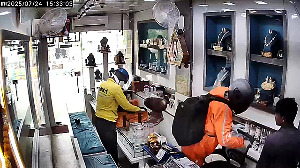 A cost-benefit evaluation of the Unique Identification Project, which aims to provide a unique 12-digit number to each of the 1.2 billion Indians, is necessary, considering difficulties in implementation and scope for misuse afterwards, a 'working paper' by a professor at Indian Institute of Management says.
A cost-benefit evaluation of the Unique Identification Project, which aims to provide a unique 12-digit number to each of the 1.2 billion Indians, is necessary, considering difficulties in implementation and scope for misuse afterwards, a 'working paper' by a professor at Indian Institute of Management says.
"There had been serious debates in countries like Australia, Canada and UK about the viability national identity policy, given that the chances of misuse of data in a centralised system increase by leaps and bounds," the WP written by Prof Rajnish Dass of IIM Ahmedabad says.
"It becomes a single point of failure," it adds.
The paper, titled 'Unique Identity Project in India: A Divine Dream or a Miscalculated Heroism?' tries to put the UID project in a perspective.
Government of India established Unique Identification Database Authority of India in January 2009, to execute this largest IT project in the world.
The project, it is envisaged, would lay foundation for better delivery of public services and targeted subsidies.
It aims to achieve financial inclusion of the poor.
Nandan Nilekani-led UIDAI has claimed that 10 crore (Rs 100 million) UIDs would be distributed by March 2011, and 60 crore (Rs 600 million) by March 2014, the WP states.
However, as of November 25, 2010, only 1,53,791 UIDs were generated.
This raises doubts about the 'optimistic target', it says.
It would be a massive project for implementation, but there are still many technological challenges in creating and managing the database of such a huge population, it adds.
About five megabytes of data will be required to store the compressed fingerprint images (of all the 10 fingers) of an individual, so the size of the entire database would be at least six petabytes (6,000 terabytes), making it among the world's largest databases, according to Professor Das.
The government of India is expected to spend as much as $250 billion over five years on programmes aimed at the poor, including subsidies for food, diesel, fertiliser, and jobs.
But 40 per cent of the benefits, as the system now stands, will go to the wrong people or 'ghosts' with fake identification papers, according to a report by the brokerage firm, CLSA Asia-Pacific Markets, the WP states.
In view of the huge cost and effort, it becomes essential to put forward a detailed cost-benefit report before the people before initiating and executing such a mammoth task, given that there are other areas of priority, Dass's paper concludes.
Image: Nandan Nilekani











